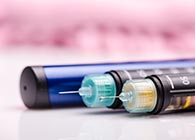Frequently Asked Questions
GM Vs animal insulin
Choices – The Evidence
Evidence from people with diabetes
A little bit of history
Facts
Action and duration times of animal and GM ‘human’ insulins
Hypoglycaemia and loss of warnings
‘Dead in Bed Syndrome’
The concerns of patients are justified
Availability of animal insulins in the UK
Changing your insulin
What to do if your consultant refuses to change your insulin
Availability of animal insulin if admitted to hospital
Frequently asked questions
Allergic reactions to insulin
![]()
Frequently asked questions
Question: ‘What is the difference between pork and beef insulin?’
Answer: Generally beef insulin is slower acting with a smoother peak of activity than pork insulin.
Question: ‘What is the difference in the activity and duration of action between animal and ‘human’ insulins?’
Answer: Generally ‘human’ insulins are faster acting, have a more aggressive action and are of shorter duration than animal insulins.
Question: ‘Is there any difference in the purity of animal and ‘human’ insulins?’
Answer: All insulins are highly purified and are equally pure.
Question: ‘If ‘human’ insulin is the cause of my problems and I change to animal insulin, how quickly can I expect to feel better?’
Answer: This seems to vary in different people. In some people some of the symptoms disappear in a matter of days with other symptoms regressing over the following weeks or months. In other people the symptoms gradually disappear over weeks and months. Some people feel that changing to animal insulin simply stops the decline in their health. You should try the new insulin for at least 6 months.
Question: ‘What will happen to my blood sugars during the changeover period?’
Answer: They may well be erratic for a few days but you should always monitor your blood glucose levels closely. Some people find that their blood sugars are raised for the first few days, so if you increase your insulin to cope with this, be prepared for your blood sugar to drop and the risk of a hypo.
Question: ‘I have heard that beef insulin can cause allergic skin reactions, is this true?’
Answer: This was a problem with the early beef insulin before it was highly purified. Now that all insulins are highly purified allergic skin reactions are far less common but any type of insulin, including ‘human’, may cause skin reactions in some people. If this is the case, then a different type of insulin should be tried.
Question: ‘Is there any risk of BSE or nvCJD from using beef insulin?’
Answer: Since 1989 beef insulin has mainly been extracted from the pancreases of US cattle and NOT cattle from the UK. Beef insulin is highly purified and the risk is extremely minimal but as there is no test available to prove that there are no prions present, it is impossible to prove that there is absolutely no risk. The UK Department of Health issued a statement to say that there was no reason to stop using beef medicinal products, including beef insulin.




































